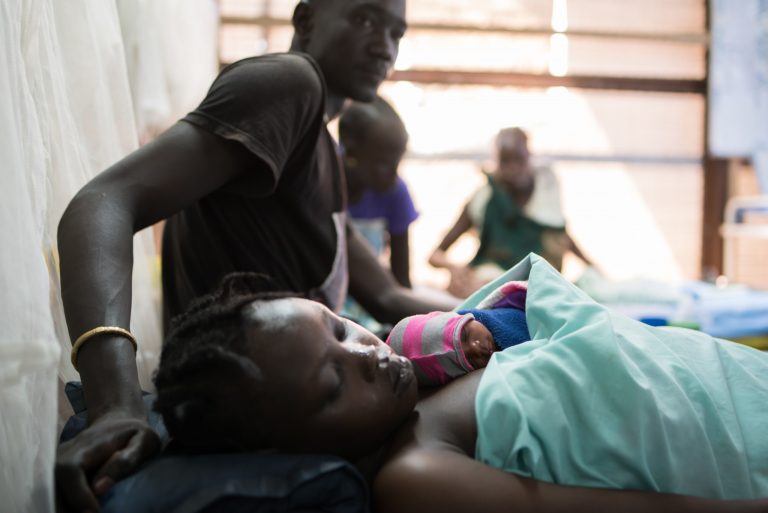“All human beings are born free and equal in dignity and rights”
– Universal Declaration of Human Rights, 1948
Human Rights Day
This Human Rights Day (December 10) marks the 70th anniversary of the Universal Declaration of Human Rights. This document proclaimed the inalienable rights which everyone is entitled to as a human being and is the most translated document in the world. Everyone includes every newborn, no matter how small or sick or vulnerable.
Yet today alone, nearly 7,000 newborns will die from preventable conditions despite the human rights owed to them. When the world committed to the Sustainable Development Goals (SDGs) in 2015, including the SDG 3.2 target of no more than 12 newborn deaths per 1000 live births by 2030, it reaffirmed the commitment to child survival. Many countries will not meet this target at their current trajectory.
Rights for Every Newborn
The United Nation’s Committee on the Rights of the Child has issued a number of resolutions specifying newborn as part of the child’s right to the highest attainable standard of health and health care. Other global forums have issued statements as well as professional associations and expert bodies, who have further defined and described newborn rights in several other instruments. All of these documents recognize that newborns have fundamental rights and freedoms, as stipulated in international law. These include the rights to survival, health and development; to a legal identity from birth; to be protected from harm, violence and neglect; and to a caring, loving and nurturing environment – even in humanitarian and fragile settings.
Actions Needed
Translation of these entitlements into domestic laws and regulations, and incorporation in protocol and guidelines for newborn care, is not only crucial for delivering respectful and dignified care for newborns, but in some cases even an obligation of governments. In order to meet SDG 3.2, countries will need to transform newborn care and embody newborn legal rights.
As we approach the 30th anniversary of the Convention on the Rights of the Child in 2019, governments will be held accountable to their commitments. Targeted advocacy and policy efforts, in collaboration with engaged and empowered parents’ organizations, health professional associations, and civil society organizations, are needed to support governments in taking forward these legal rights at national and sub-national levels. As part of this advocacy, discussions are underway among partners who led the Respectful Maternity Care Charter to develop something similar for newborns.
Key Documents that Support Newborn Rights:
Convention on the Rights of the Child
The Convention on the Rights of the Child (CRC) ensured that newborn health became a human rights issue. The CRC, adopted by the United Nations General Assembly on November 20, 1989, is a multilateral human rights treaty promoting the rights of all children worldwide. According to Article 24 of the CRC, all children have a right to the highest attainable standard of health and health care, and Member States have an obligation to reduce infant and child mortality. The General Comment No. 15 by the Committee on the Rights of the Child reinforced the legal obligations of States to reduce child mortality by calling for particular attention on reducing neonatal mortality. Resolution A/HRC/22/L.27/Rev.1 calls for the right of the child to the enjoyment of the highest attainable standard of health and elimination of preventable maternal and child mortality and morbidity. The resolution further requests Member States to renew their political commitment and take action to address the main causes of mortality and morbidity.
The Abu Dhabi Declaration for Women and Children
The Abu Dhabi Declaration for Women and Children, released in 2015, urges the global stakeholders to uphold the dignity, health and wellbeing of every woman and child in humanitarian and fragile settings. This declaration calls for a more strategic focus on reproductive, maternal, newborn, child, and adolescent (RMNCA) health and wellbeing within a development and humanitarian continuum, over the life course, in accordance with the needs of specific settings. It also calls for purposeful national and subnational strengthening of the resilience of health systems and RMNCA services so that quality health service delivery is made both more possible and more probable in crisis settings and in the context of disasters and conflicts.
Professional Association and Other Initiatives
Professional associations and experts have further articulated the rights of newborns and infants, including the Declaration of Barcelona on the Rights of Mother and Newborn, and the Parma Charter on the Rights of the Newborn.
- The World Congress of Perinatal Medicine adopted the Declaration of Barcelona on the Rights of Mother and Newborn, spearheaded by the World Association of Perinatal Medicine in 2001.
- The Parma Charter on the Rights of the Newborn, published in the Journal of Maternal-Fetal and Neonatal Medicine in 2011, which provides a detailed list of rights related to the promotion and protection of newborn health.
- In 2016, the World Association for Infant Mental Health published a Position Paper on the Rights of Infants, listing both basic principles of infant rights (birth to 3 years), and social and health policy areas to be informed by the basic principles. Increasingly, national health professional associations, such as the Saudi Society for Neonatology, adopt declarations on the rights of newborns, providing guidance to its members on how to ensure rights-based and child-centred care.
